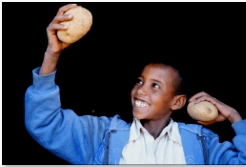Everything you want to know about super spuds
All We Can is so excited and enthused by all the questions we have received from supporters wanting to know more about the Ethiopian potatoes featured in our Harvest Appeal. We understand not all of our supporters are potato experts so, our Director of Programmes Angela Zamaere-Smith, answers some commonly asked questions to give you more information about these super spuds.
What type of potatoes are being grown?
The potato seeds that are being provided as part of the Harvest Appeal are developed at the Debrebirhan Agricultural Research Centre – an agricultural centre based in the town nearest to the rural community which we are supporting. They are developed to be well suited for the very particular soils and microclimate in which they are grown. The variety that is being used in the community this year is called ‘Gera’, and is suitable for the agro-ecology and soil types of the project sites, specifically to the Cherkos village – the community upon which we are focusing this Harvest. They are planted during the rainy season of June-August, and take about ten weeks to grow. This means that the potatoes are ready and when stored well can last through the months of September – November, when families in the village might otherwise go hungry.
Potatoes are great, but what about other vegetables?
Along with learning how to grow potatoes the families are also supported and encouraged to grow a variety of vegetables and some are supported to raise chickens for their eggs. The families also learn how to market their crops so that they can make a profit from any extra they grow. They can then use this money to buy other foods and invest in their children’s education.
What about pests, how do the farmers protect the potatoes from pests and diseases?
The families receive training and support on how to protect and treat their potatoes from pests and potential diseases. The families are also encouraged to grow a variety of produce so they aren’t dependant on one crop. This reduces their vulnerability in the event of their crops being affected by pests or disease.
How else is All We Can supporting families in Ethiopia to cope with climate change?
Providing potatoes to the families is part of a much wider programme All We Can is supporting in Ethiopia which also includes:
1) Natural resource management, specifically restoring degraded farm land through physical structures and planting trees and shrubs, along with creating protected areas where people can’t chop down trees or graze their animals. All We Can is also promoting fuel saving stoves to reduce reliance on trees for fuel.
2) Improving crop production, by training farmers on improved agricultural methods and supplying improved seeds so farmers can grow sufficient staple grains (like wheat and teff, a small, nutritionally dense grain local to Ethiopia) so families have food to eat and in many cases, income to support their other needs.
3) Helping families diversify their income streams, departing from a sole focus on grain production to other activities like beekeeping and honey production, rearing small livestock, along with growing fruit and vegetables. The benefit of these activities is that they often also contribute to improving household nutrition.
All We Can is on a committed journey with the families in all these areas. Training is providing for families where they learn the knowledge and skills they need, and they are also provided with the things they need to get them started such as tree seedlings, improved grains, livestock or fruit and vegetable seeds and seedlings.
How sustainable is all this?
All We Can is supporting communities to produce better harvests by using climate smart agriculture. This is done by introducing new seeds and vegetables – such as potatoes, which grow well in the changing climate. Climate smart agriculture addresses the interlinked challenges of food security and climate change with an aim to increase productivity and enhance resilience. All We Can support families through training to use weather and climate information in their farming practices, in order to increase their chances of a harvest. Looking at weather and climate reports means families can make smart, informed choices about what crops to plant and when to plant them. For example if delays in the rainy season are predicted, then farmers delay planting their crops. Alongside this climate smart approach, communities are also trained in farming techniques and business skills, which helps to ensure successful harvests for the future, providing much needed food and an income stream for families.
The climate crisis in Ethiopia means families are going hungry. Will you help families grow potatoes to beat hunger?
The shortcode is missing a valid donation form ID attribute.

